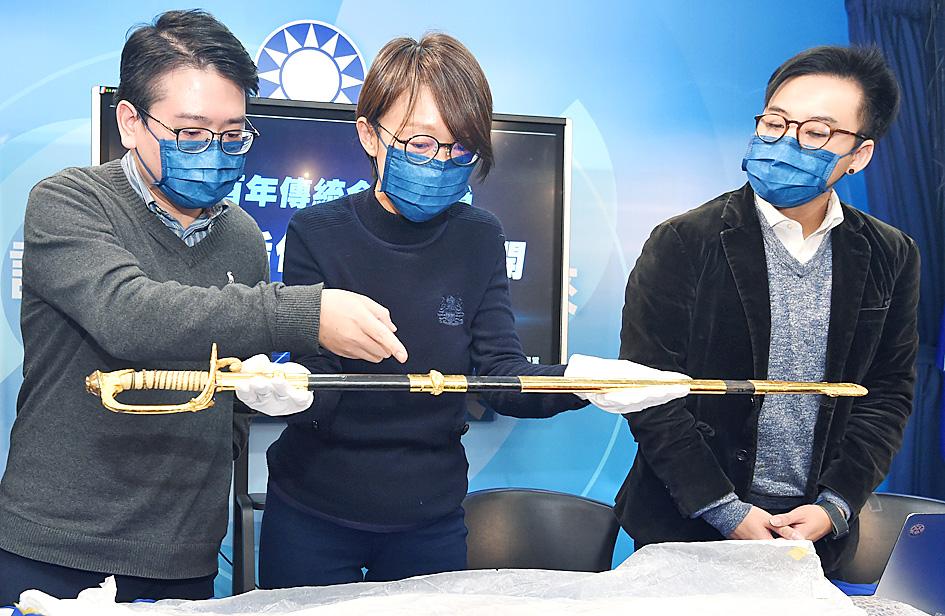The Chinese Nationalist Party (KMT) is to use non-fungible tokens (NFTs) in a bid to revitalize the party’s archives, KMT officials said yesterday at a news conference in Taipei that showcased a ceremonial sword belonging to Chiang Kai-shek (蔣介石), the first piece of the collection to be utilized in the project.
NFTs are a blockchain technology used for digital files that provide proof of ownership or a certificate of authenticity.
KMT Culture and Communications Committee deputy director-general Lin Chia-hsing (林家興), who is also the curator of the archives, said that digitizing the collection is part of the party’s efforts to revamp its image and fundraising capabilities via innovation and technology.

Photo: Liao Chen-huei, Taipei Times
The drive was authorized by the KMT Central Standing Committee in October, Lin said.
NFTs of Chiang’s sword featured at this year’s CES (formerly the Consumer Electronics Show), which was held in Las Vegas, Nevada, last week, he said.
The sword was presented to Chiang by a San Francisco-based overseas compatriot association in 1949 and its blade bears an inscription that reads: “For the suppression of rebellion and the founding of the nation,” Lin said.
Taiwan Blockchain Academia president Peng Shao-fu (彭少甫) said NFT technology could help the KMT contest Beijing’s narrative that the Chinese Communist Party battled imperial Japan during World War II.
The technology could also boost the KMT’s appeal to young people by bringing artifacts in its collection to a broader audience, helping to promote the party’s perspective on the history of the Republic of China, Peng said.
The KMT is to use NFTs as gratitude certificates for donors and the transaction fees would further bolster the party’s revenue, he said.
“Creating digital exhibits of precious artifacts in the metaverse would be particularly meaningful when starting a dialogue with young people,” Peng said.
Additional reporting by CNA

Alain Robert, known as the "French Spider-Man," praised Alex Honnold as exceptionally well-prepared after the US climber completed a free solo ascent of Taipei 101 yesterday. Robert said Honnold's ascent of the 508m-tall skyscraper in just more than one-and-a-half hours without using safety ropes or equipment was a remarkable achievement. "This is my life," he said in an interview conducted in French, adding that he liked the feeling of being "on the edge of danger." The 63-year-old Frenchman climbed Taipei 101 using ropes in December 2004, taking about four hours to reach the top. On a one-to-10 scale of difficulty, Robert said Taipei 101

Taiwanese and US defense groups are collaborating to introduce deployable, semi-autonomous manufacturing systems for drones and components in a boost to the nation’s supply chain resilience. Taiwan’s G-Tech Optroelectronics Corp subsidiary GTOC and the US’ Aerkomm Inc on Friday announced an agreement with fellow US-based Firestorm Lab to adopt the latter’s xCell, a technology featuring 3D printers fitted in 6.1m container units. The systems enable aerial platforms and parts to be produced in high volumes from dispersed nodes capable of rapid redeployment, to minimize the risk of enemy strikes and to meet field requirements, they said. Firestorm chief technology officer Ian Muceus said

MORE FALL: An investigation into one of Xi’s key cronies, part of a broader ‘anti-corruption’ drive, indicates that he might have a deep distrust in the military, an expert said China’s latest military purge underscores systemic risks in its shift from collective leadership to sole rule under Chinese President Xi Jinping (習近平), and could disrupt its chain of command and military capabilities, a national security official said yesterday. If decisionmaking within the Chinese Communist Party has become “irrational” under one-man rule, the Taiwan Strait and the regional situation must be approached with extreme caution, given unforeseen risks, they added. The anonymous official made the remarks as China’s Central Military Commission Vice Chairman Zhang Youxia (張又俠) and Joint Staff Department Chief of Staff Liu Zhenli (劉振立) were reportedly being investigated for suspected “serious

American climber Alex Honnold is to attempt a free climb of Taipei 101 today at 9am, with traffic closures around the skyscraper. To accommodate the climb attempt and filming, the Taipei Department of Transportation said traffic controls would be enforced around the Taipei 101 area. If weather conditions delay the climb, the restrictions would be pushed back to tomorrow. Traffic controls would be in place today from 7am to 11am around the Taipei 101 area, the department said. Songzhi Road would be fully closed in both directions between Songlian Road and Xinyi Road Sec 5, it said, adding that bidirectional traffic controls would